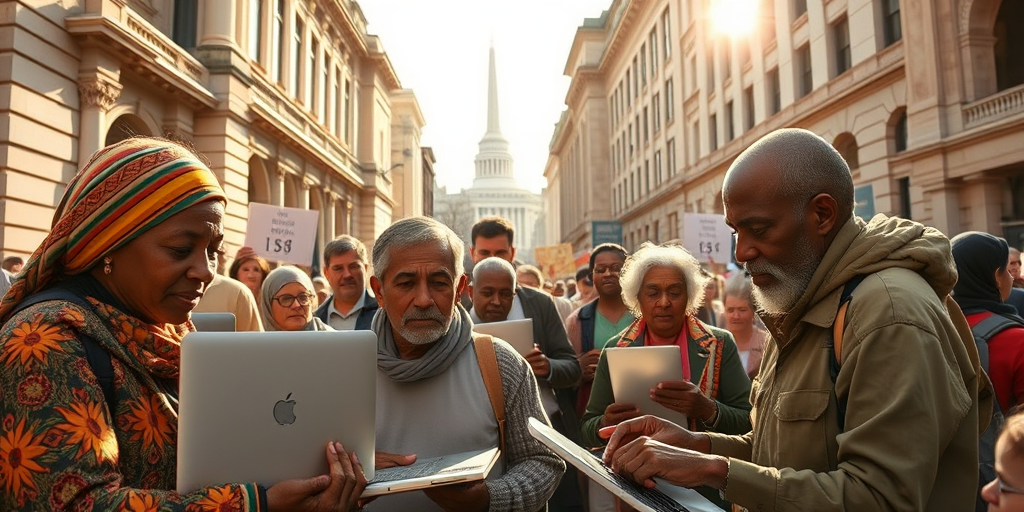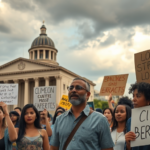Trump Targets Digital Equity Act: A Move Sparking Controversy and Concern
The Digital Equity Act, a program enacted in 2021 to bridge the digital divide in the United States, faces termination following recent statements by former President Donald Trump. He has labeled the program as “racist and illegal,” a move that has drawn widespread attention and controversy, particularly among those who have benefited from the program’s initiatives in rural and underserved communities.
Background: Bridging the Digital Divide
The Digital Equity Act was introduced as part of a larger $65 billion investment aimed at enhancing internet access nationwide. Its goal was to provide high-speed internet, computers, telehealth services, and job skills training to underserved populations, which include rural areas and various disadvantaged groups. A significant part of the program’s mission has been to address digital disparities by offering states and tribes flexibility in resource allocation, ensuring inclusivity among a wide range of demographic categories.
Despite the laudable objectives, Trump’s announcement to end the initiative mischaracterizes the Act as a “woke handout based on race.” In reality, the Act makes limited references to race, emphasizing a holistic approach to inclusivity among several demographic identifiers, such as age, gender, and disability. The Act’s termination could stymie progress made in digital literacy and accessibility, posing dire implications for communities relying on these resources.
Local Impact: Communities Left in Limbo
The potential cancellation of the Digital Equity Act raises significant concerns for local communities that have been gradually bridging the digital divide. Programs under this Act have made substantial strides, from distributing laptops in rural Iowa to offering digital literacy courses in Oregon. Such initiatives have facilitated residents’ ability to engage with digital platforms for critical needs like online education, telehealth, and job applications.
Brandon Dorn, a Portland resident attending Free Geek’s digital literacy training, echoes this sentiment. “Everything has to go through the computer these days, and these classes help make that less daunting. Losing this support would mean losing independence for many of us,” he shares.
For organizations like Free Geek, Trump’s announcement places them in a precarious position. The cessation of federal funding forces nonprofits to seek alternative sources to continue their operations. Juan Muro, Free Geek’s executive director, emphasizes the challenge: “We’re now scrambling to fundraise enough to provide people with the basic digital tools they need.”
The Broader Perspective: Crimes of Complacency?
Advocacy groups have expressed desperation over the decision to end the program, arguing that it reflects a broader misunderstanding of the digital access crisis. Access to technology has become a lifeline, essential for daily functions and survival, particularly in remote and underfunded areas.
“The digital divide isn’t just about internet access; it’s about being able to use technology for essential tasks,” says Angela Siefer, Executive Director of the National Digital Inclusion Alliance. Her organization awaits a $25.7 million grant from the program to help communities access tech resources.
Senator Patty Murray of Washington, an advocate of the Act, criticized the termination as “insane” given its bipartisan support and critical aim to support children and families in rural areas striving for digital access to complete homework and access educational resources. “It’s absolutely nuts that Trump is blocking resources to help make sure kids in rural school districts can get internet for their studies,” she exclaimed.
Future Implications
The potential termination of this Act serves as a bellwether for future digital equity efforts. If Trump’s efforts to end the program are successful, stakeholders fear a setback in digital inclusivity progress. “We were only beginning to address long-standing issues with digital access,” Siefer stated, “and cutting off support now would leave countless people without the resources they need to navigate today’s digital world.”
With more than one-fifth of Americans lacking home broadband, according to Pew Research Center, and rural communities at a 27% deficit, the need for initiatives like the Digital Equity Act has never been more apparent. The Act’s removal could hamstring ongoing efforts to provide crucial resources like digital navigators—individuals who help newcomers to the internet efficiently and safely engage with online platforms.
Community Resources and Moving Forward
As community members grapple with uncertainties about the future of digital equity support, local resources may serve as a temporary buffer. Residents can seek out local nonprofits for assistance and stay engaged through public forums to express their needs and concerns.
The debate over the Digital Equity Act is emblematic of broader national conversations about equity, access, and the role of government in ensuring a level playing field. While the Act’s fate remains uncertain, communities continue to advocate for necessary resources and structural changes that foster inclusivity and empower all Americans to thrive in a digitally driven society.







